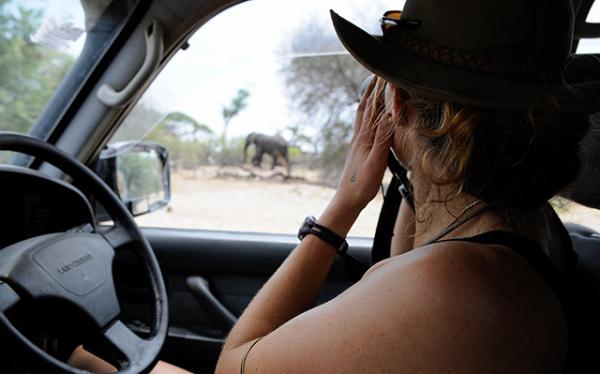KID REPORTERS’ NOTEBOOK
Saving Africa’s Elephants
Sadie with Kate Evans, founder and director of Elephants for Africa, at the Memphis Zoo in Tennessee
Ever since she was a child, Kate Evans has been fascinated by elephants. Growing up in the United Kingdom, she was drawn to these beloved creatures. When she encountered orphaned elephants on a childhood trip to Sri Lanka, Evans knew that she wanted to help them live “free and happy lives.”
Today, Evans is the founder and director of Elephants for Africa, a conservation organization based in Botswana, a country in Southern Africa. After hearing her speak at the Memphis Zoo in Tennessee, I interviewed her about her work via Skype.
Evans explained that there are three main threats facing elephants in Africa: poaching (for their tusks), conflict with humans, and habitat loss. Despite international regulations, tens of thousands of elephants are killed each year for their ivory tusks. According to the World Elephant Society, 62 percent of African elephants have been killed in the past decade, leaving only about 400,000 in the wild. Evans and other conservationists are determined to save the animals before it’s too late.

Evans at work in the field to conserve elephants
WORKING WITH COMMUNITIES
In Botswana, conflict with humans is the biggest threat facing elephants, Evans said. When elephants trample farmland or eat crops, farmers are allowed to kill them. As devastating as this is for the elephants, she said, “it’s very important that these communities are able to live safely and successfully.”
Elephants for Africa partners with local farmers to help them protect their land in ways that benefit both the farmers and the elephants. “One of the most rewarding and challenging aspects of our work,” Evans said, “[is] to engage with the communities, partner with them, and learn from them.”
Evans and her team also work with local schools to help students “become problem-solvers in the future.” The organization sponsors visits to a nearby national park, where students can enjoy wildlife in a peaceful setting and learn more about science and nature.
Evans believes that empowering future generations to make a positive difference in the world is essential. She wants young people everywhere to realize their power as individuals. “Think of a small thing you can do every day,” she said, “to be the change that you want to see.”
